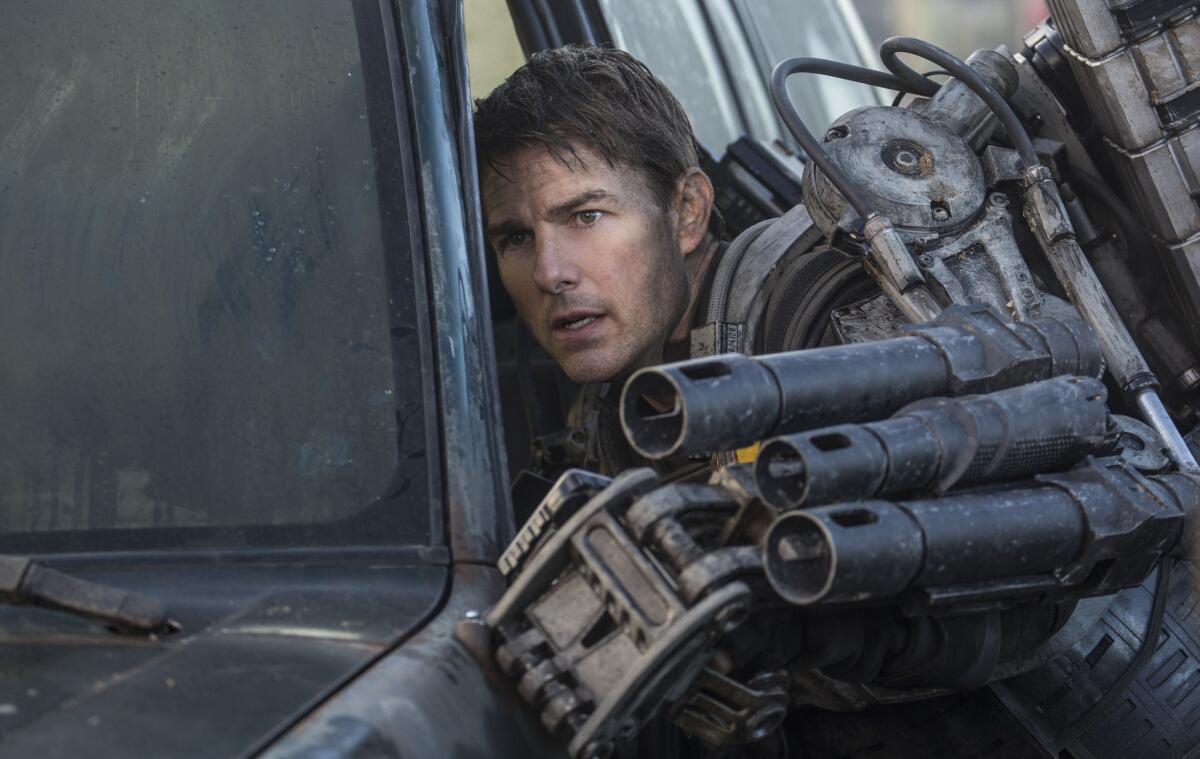‘Edge of Tomorrow’ disappoints, highlights Warner’s risky summer

- Share via
Summer may not have technically begun yet, but Warner Bros. may already be itching for a vacation.
First, the film studio released the Adam Sandler-starring “Blended,” which has grossed a disappointing $45 million worldwide since bowing May 23.
Then Warner Bros. said last week that it was delaying the release of “Jupiter Ascending,” a hoped-for blockbuster that had been slated to debut July 18.
Now, its most recent movie, “Edge of Tomorrow,” recorded a weak $28.7-million domestic opening over the weekend.
The film, a sci-fi action picture that stars Tom Cruise and cost $178 million to produce, finished No. 3 on the weekend, behind fellow newcomer “The Fault in Our Stars” and the blockbuster “Maleficent.”
It’s a rare string of setbacks for Burbank-based Warner Bros., Hollywood’s biggest movie studio.
“I think all we can control is to make great movies with the best, most talented people,” said Greg Silverman, Warner’s president of creative development and worldwide production. “If we do that consistently we’ve always proven that you win in the end.”
The studio’s summer slate looked risky from the start because it was lacking in big franchises. In years past, Warner Bros. has relied on action films and comedies based on tested intellectual property -- which tend to be safer bets at the box office.
“Godzilla,” the studio’s only traditional franchise film of the summer, has performed well since being released May 16. The picture, which stars Bryan Cranston, has taken in about $400 million worldwide.
Although they feature A-list stars, films such as “Edge of Tomorrow” and “Blended” are inherently riskier than sequels or other projects developed from properties with brand recognition, said Paul Dergarabedian, senior media analyst at Rentrak, an entertainment data firm.
“People always talk about the lack of originality in Hollywood, but by and large people don’t show up for those original films,” he said. “Audiences now are so conditioned -- they almost expect there is going to be a brand they know and love and understand before they plunk down their money.”
Warner Bros.’ biggest hit of 2014, “The LEGO Movie,” was, of course, based on well-known intellectual property. It has taken in more than $460 million worldwide.
The studio has gone through other recent rough patches and bounced back. Warner Bros. started 2013 by releasing five films in a row that underperformed at the box office, including “Jack the Giant Slayer,” a roughly $195-million production that flopped.
Warner Bros.’ 2013 fortunes improved considerably over the summer, when it released a handful of big sequels and pictures based on iconic intellectual property, including “The Hangover Part III” and “Man of Steel.” The studio ultimately finished the year No. 1 in box-office market share. Warner Bros. has finished first or second in market share in nine of the last 10 years.
Silverman said that the studio would not shy away from making new films that it hopes have franchise potential.
“You have to have a mix of original and branded material,” he said. “This studio has such a rich history of creating franchises and I don’t want to give up on that.”
With a budget of $178 million, and marketing costs of tens of millions of dollars more, “Edge of Tomorrow” has a long way to go in order to become profitable, though the studio is touting a strong opening weekend overseas as reason for optimism. The film has grossed $111.4 million internationally.
But Dergarabedian said the main takeaway from last weekend was that “The Fault in Our Stars,” an inexpensive film based on a popular young adult novel, handily “beat Tom Cruise in the summer.”
20th Century Fox’s “The Fault in Our Stars” exceeded analysts’ expectations by taking in about $48 million over the weekend. The domestic performance of “Edge of Tomorrow,” was in line with experts’ predictions.
Dergarabedian said that the success of “The Fault in Our Stars” and Walt Disney Studios’ Angelina Jolie-starring “Maleficent” illustrate the value of appealing to female audiences.
“The paradigms are shifting,” Dergarabedian said.
Warner Bros.’ next film, “Jersey Boys,” will debut June 20. The project, based on the hit musical of the same name, was directed by Clint Eastwood. The film was inexpensive to make, but according to those who have seen prerelease audience surveys, it could gross in the range of $10 million over its opening weekend.
“Tracking is really all over the place in terms of accuracy,” said Silverman, adding that audiences have responded positively to the film in advance screenings. “Early word is really good.”
In July, Warner Bros. will release “Tammy,” a comedy starring box-office draw Melissa McCarthy. Warner Bros. has high hopes for the picture. It is based on a script co-written by McCarthy.
Meanwhile, “Jupiter Ascending” will now come out in February. Warner Bros. has said that it delayed the release of the sci-fi epic, directed by Lana and Andy Wachowski, so that it could have more time to work on the project’s visual effects.
The studio’s other forthcoming high-profile releases for the year include “Horrible Bosses 2” and the final film in “The Hobbit” trilogy.
Both are sequels to hit movies -- and in line with a strategy outlined by Silverman.
“To get to a sequel you have to make a great original movie,” he said.
Follow @DanielNMiller for film business news.
More to Read
Sign up for The Envelope
Get exclusive awards season news, in-depth interviews and columnist Glenn Whipp’s must-read analysis straight to your inbox.
You may occasionally receive promotional content from the Los Angeles Times.







